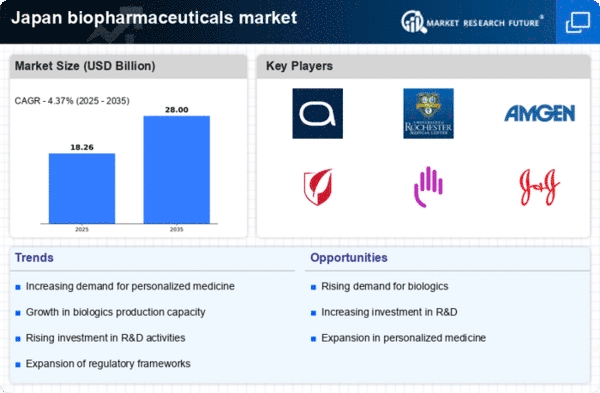Growing Aging Population
The aging population in Japan is a critical driver for the biopharmaceuticals market. As the demographic shifts towards an older age group, the demand for innovative therapies and treatments for age-related diseases is increasing. In 2025, approximately 28% of Japan's population is projected to be over 65 years old, which significantly impacts healthcare needs. This demographic trend necessitates the development of biopharmaceuticals that address chronic conditions such as diabetes, cardiovascular diseases, and neurodegenerative disorders. Consequently, pharmaceutical companies are likely to invest in research and development to create targeted therapies, thereby expanding the biopharmaceuticals market. The increasing prevalence of these conditions among the elderly population suggests a robust growth trajectory for the industry, as healthcare providers seek effective solutions to improve the quality of life for older adults.
Advancements in Biotechnology
Technological advancements in biotechnology are propelling the biopharmaceuticals market in Japan. Innovations such as CRISPR gene editing, monoclonal antibodies, and recombinant DNA technology are revolutionizing drug development processes. These advancements enable the creation of more effective and targeted therapies, which are essential for treating complex diseases. In 2025, the biotechnology sector is expected to contribute significantly to the overall pharmaceutical market, with biopharmaceuticals accounting for over 50% of total drug sales. This shift towards biopharmaceuticals is indicative of a broader trend where traditional small-molecule drugs are being replaced by biologics. As a result, companies are likely to focus on harnessing these technologies to enhance their product pipelines, thereby driving growth in the biopharmaceuticals market.
Rising Healthcare Expenditure
Japan's increasing healthcare expenditure is a significant driver for the biopharmaceuticals market. The government has been investing heavily in healthcare infrastructure and services, with total healthcare spending projected to reach ¥50 trillion by 2025. This rise in expenditure is primarily aimed at improving access to advanced medical treatments and technologies, including biopharmaceuticals. As healthcare budgets expand, there is a growing emphasis on funding innovative therapies that can provide better health outcomes. Consequently, this trend is likely to stimulate demand for biopharmaceutical products, as healthcare providers seek to incorporate cutting-edge treatments into their offerings. The rising healthcare expenditure reflects a commitment to enhancing patient care, which is expected to further bolster the biopharmaceuticals market.
Regulatory Support and Framework
The regulatory environment in Japan plays a pivotal role in shaping the biopharmaceuticals market. The Pharmaceuticals and Medical Devices Agency (PMDA) has implemented streamlined approval processes for biopharmaceutical products, which encourages innovation and expedites time-to-market. In recent years, the PMDA has introduced initiatives aimed at fostering collaboration between regulatory bodies and industry stakeholders, enhancing the overall efficiency of the drug approval process. This supportive regulatory framework is likely to attract both domestic and international biopharmaceutical companies to invest in Japan. As a result, the market is expected to witness an influx of new products, contributing to the growth of the biopharmaceuticals market. The emphasis on regulatory support indicates a favorable environment for the development and commercialization of innovative therapies.
Increased Focus on Preventive Medicine
The shift towards preventive medicine in Japan is emerging as a crucial driver for the biopharmaceuticals market. With a growing awareness of health and wellness, there is an increasing demand for biopharmaceuticals that can prevent diseases rather than merely treat them. This trend is reflected in the rising interest in vaccines, gene therapies, and other preventive measures. In 2025, the market for preventive biopharmaceuticals is anticipated to grow by approximately 15%, indicating a robust interest in proactive healthcare solutions. As healthcare providers and patients alike prioritize prevention, biopharmaceutical companies are likely to invest in research and development to create innovative preventive therapies. This focus on preventive medicine is expected to reshape the landscape of the biopharmaceuticals market, driving growth and fostering a healthier population.
















